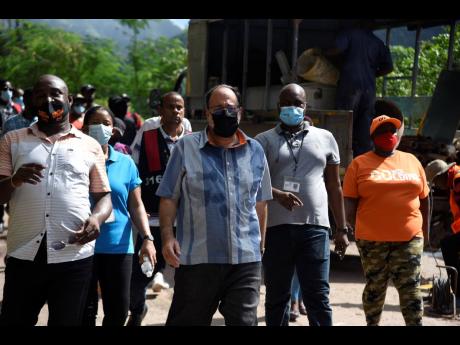River clash - No relocation of flood-hit Weise Road residents – Golding
In a stark divide from the Holness administration’s contemplation to resettle flood-ravaged households in areas like Bull Bay, St Andrew, newly minted Opposition Leader Mark Golding is insisting that those residents do not need to be relocated.
During a tour on Thursday of Weise Road, the epicentre of storm rains that swelled the Chalky River and swamped homes in silt, Golding made the declaration amid the increasing crescendo of national dialogue on moving vulnerable residents out of disaster zones.
But the opposition leader shifted the weight of responsibility on to state authorities for failing to invest in river training to mitigate flood nightmares residents endured when the outer bands of tropical storms Zeta and Eta besieged the community over two weeks.
“There’s no need to relocate the residents. They don’t want to be relocated. Just clean the gully and maintain the gully edge; that’s all that needs to happen,” said Golding.
‘DISRESPECTFUL’
Describing the homes on Weise Road as “well-established”, Golding criticised the prime minister’s address in Parliament on Tuesday about informal settlements.
“The idea of attributing labels like that to them, especially amid disaster which has befallen them, which is not their fault ... they’re going to be hurt by that,” said the opposition leader, citing his interpretation of Holness’ remarks.
Diana McCaulay, director of the Jamaica Environment Trust, said on Thursday that politicians were not qualified to make, on a whim, life-changing decisions like relocation.
“It is very difficult for somebody to stand up on the ground and decide whether people living on a floodplain or close to a river should relocate. It needs far more in-depth research of the geology,” McCaulay told The Gleaner, citing research by The University of West Indies’ Department of Geology as key to decision-making.
However, McCaulay criticised the concept of river training as wrong-headed. She believes training to be the root cause of many flood events, constraining the natural space rivers have and requiring continuous desilting.
River training “makes the channel more narrow, makes the absorption less, makes the velocity of the river faster and more destructive and destroys all the natural functions of the river,” she said in a letter to the editor.
SMALL BUDGET
Retired river-training and sea-defence expert Edgar Llewellyn, who was employed to the National Works Agency (NWA) for 40 years, estimates that taming Jamaica’s rivers would cost upwards of half a billion dollars yearly. That means the $50 million allocated in the NWA’s annual budget is just a tenth of the optimal maintenance cost.
“If maintained as they should, it lessens the risk of flooding, and the risk of people getting injured and property being lost,” Llewellyn, who managed the training of the Chalky River in the past, told The Gleaner.
Llewellyn said that restorative work goes beyond desilting to other protective work to prevent slippages along riverbanks.
“We use galvanised wire of different gauges specially weaved at the bottom of the bund to push up at an angle, slanting, maybe sometimes 15 to 20 feet in height, and then we use that weave wire to go over it and protect it,” said Llewellyn. Furthermore, wild cane is planted 12 feet apart along rivers to keep the soil compact.
However, the construction of houses on bunds has rendered the intervention ineffective, he added.
Stephen Shaw, communications manager at the NWA, said that while frequency and topography were key indices in selecting rivers, funding represented the greatest challenge.
“This figure (the $50 million), like other numbers in the budget for other heads, is well below what the demand is for river training, but we nonetheless implement works in every sensitive area through a programme,” Shaw said.
McCaulay is encouraging Jamaica to adopt the Room for River programme, a Dutch initiative geared at moving people and infrastructure off floodplains.
“If you restore rivers to their functional state, they actually can absorb much more water than if you straighten them out and channelise them,” she said.

